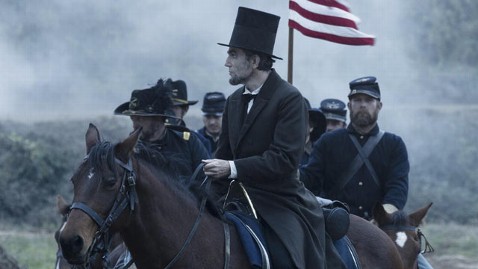Screenwriter Admits Lincoln Inaccuracy, But Points Out It Is a Movie

20th Century Fox
And winner in the category for most accurate historical drama goes to …
Wait. There is no such Oscar category. But there is Best Picture. And two of the nominees in that category are under fire from Congress for being inaccurate.
Psst: Turns out that when you watch the Hollywood movie "Lincoln," you're watching a bit of historical drama. Which is to say a Hollywood drama based on actual events.
And we're not just talking about " Zero Dark Thirty." There's no shortage of lawmakers who have questioned the historical accuracy of the film about the decade-long hunt for Osama bin Laden and whether "enhanced interrogation techniques" like waterboarding (some people call that torture) actually led to the capture of the terrorist leader.
Or should they have been included in the movie just because the U.S. government engaged in them during their hunt for the now-dead terrorist. That's a squishy debate and the historical jury is probably still out.
There's a more fundamental error in "Lincoln," and it was spotted by Rep. Joe Courtney, a Connecticut Democrat.
Read More About the 2013 Academy Awards
During the pivotal scene in which the House of Representatives votes on the 13 th Amendment to the Constitution, which ended slavery, you see two Connecticut lawmakers vote "no." That's just plain wrong. All four of Connecticut's House representatives voted for the amendment.
Courtney was shocked and appalled and, after a little historical research, wrote a strongly worded letter to Steven Spielberg asking that the movie be corrected.
OK, maybe "strongly worded" is the wrong way to characterize Courtney's letter, which avers that the "rave reviews are justified: Daniel Day-Lewis is tremendous, the story is compelling and consuming, and the cinematography is beautiful.
"When two of three members of the Nutmeg State's House delegation voted to uphold slavery, I could not believe my own eyes and ears," he wrote. "How could congressmen from Connecticut - a state that supported President Lincoln and lost thousands of her sons fighting against slavery on the Union side of the Civil War - have been on the wrong side of history?"
He later added: "I understand that artistic license will be taken and that some facts may be blurred to make a story more compelling on the big screen, but placing the state of Connecticut on the wrong side of the historic and divisive fight over slavery is a distortion of easily verifiable facts and an inaccuracy that should be acknowledged, and if possible, corrected before "Lincoln" is released on DVD.
"Lincoln" screenwriter Tony Kushner was nonplussed by the critique - though he conceded the inaccuracy in the Wall Street Journal Friday.
"In making changes to the voting sequence, we adhered to time-honored and completely legitimate standards for the creation of historical drama, which is what "Lincoln" is. I hope nobody is shocked to learn that I also made up dialogue and imagined encounters and invented characters," wrote Kushner, who went on to argue that while Connecticut's lawmakers voted in favor of the amendment, the state was not "solidly" pro-Lincoln.
"As Connecticut Civil War historian Matthew Warshauer has pointed out, "the broader context of Connecticut's history doesn't reflect what Courtney had said in his letter. The point is we weren't unified against slavery." We didn't dig into this tangled regional history in "Lincoln" because a feature-length dramatic film obviously cannot accommodate the story of every state, and more to the point, because that's not what the movie was about.
"I'm sorry if anyone in Connecticut felt insulted by these 15 seconds of the movie, although issuing a congressional press release startlingly headlined "Before The Oscars…" seems a rather flamboyant way to make that known. I'm deeply heartened that the vast majority of moviegoers seem to have understood that this is a dramatic film and not an attack on their home state."
Read Kushner's full letter HERE.
Courtney, apparently, wanted the last word, however, He released a new statement Friday with the title, "Courtney statement on Kushner concession that 'Lincoln' got it wrong on Connecticut votes."
"My effort from the beginning has been to set the record straight on this vote, so people do not leave the theater believing Connecticut's representatives in the 38 th Congress were on the wrong side of history. This is a positive step toward that end, and I still hope a correction can be made in advance of the film's DVD release," said Courtney.
He then referred to more than 4,000 Connecticut Civil War casualties and added, "Their sacrifice emphatically demonstrates Connecticut's fidelity to the struggle to preserve the Union and end slavery, which is represented in 'Lincoln' dramatically by the House's vote on the 13 th Amendment. The four members of Connecticut's delegation reflected that commitment on Jan. 31, 1865, and they deserved a better legacy than the screenplay portrayed."
Aside: Unvoiced are questions about the accuracy of why Jennifer Lawrence's character would have anything to do with Bradley Cooper's in "Silver Linings Playbook." And "Abraham Lincoln: Vampire Hunter" trod new ground in the realm of historical inaccuracy, although it was not nominated for any Oscars.